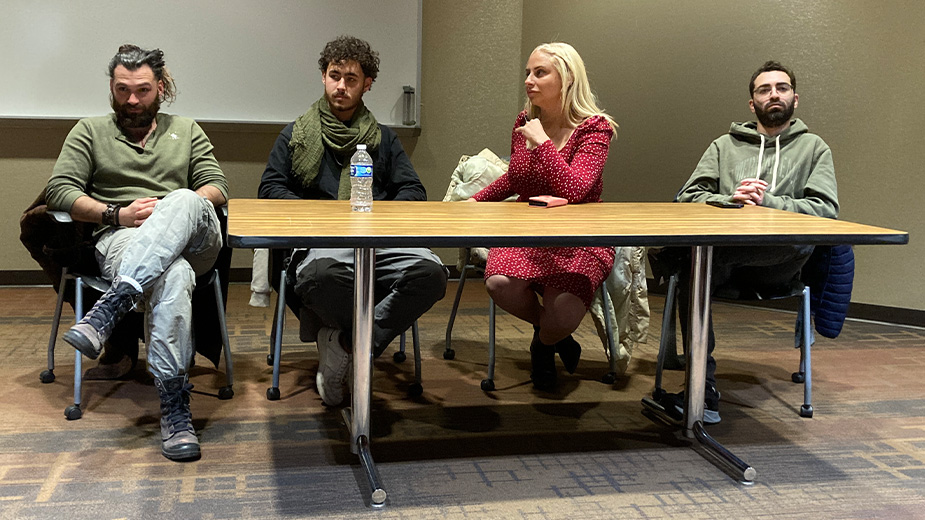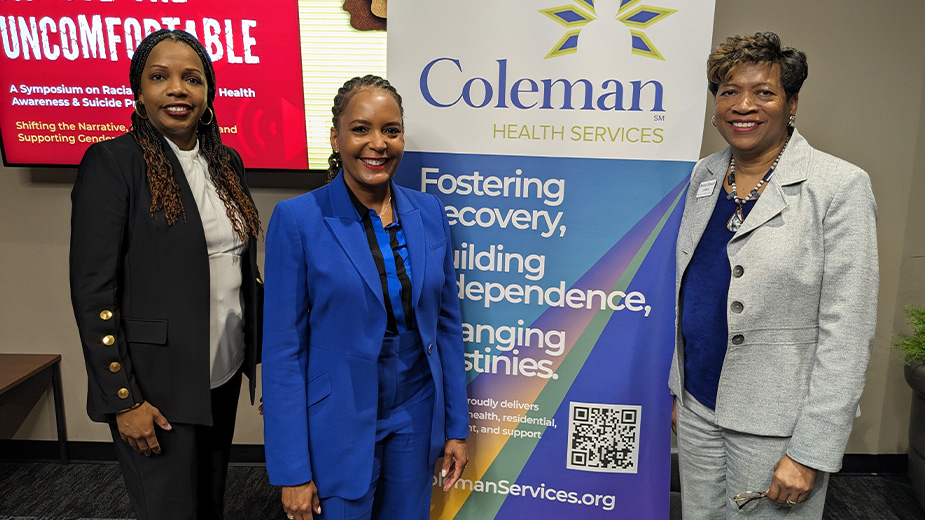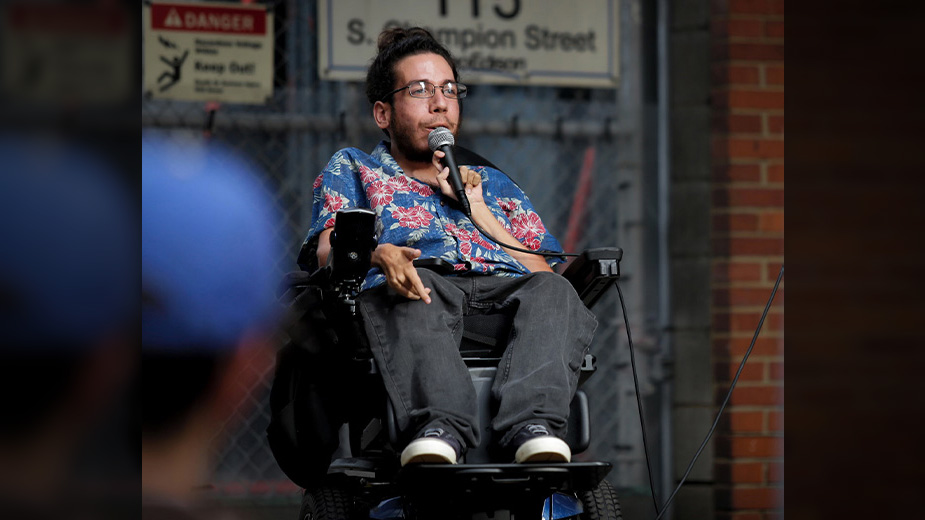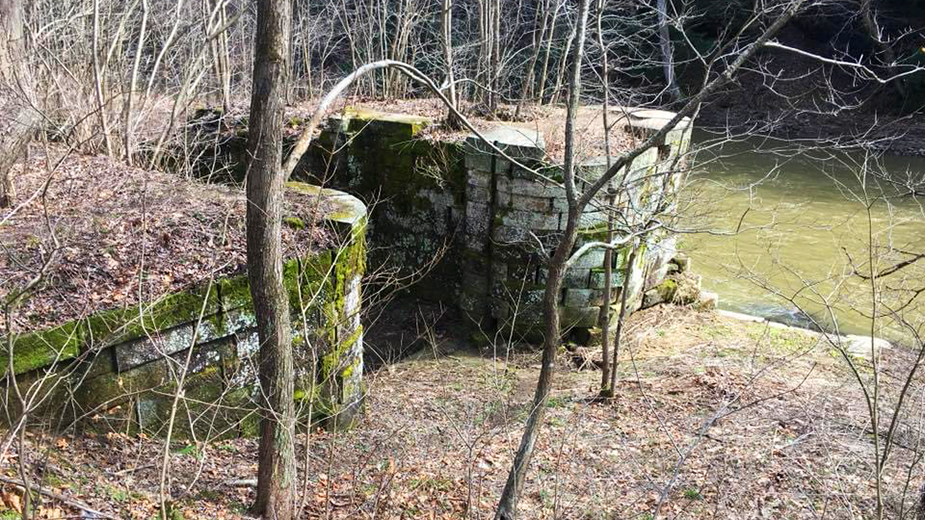Israeli Survivors of Oct. 7 Attack Share Stories at YSU
YOUNGSTOWN, Ohio – They were at a music festival or in their homes in Israel on Oct. 7 when they heard rockets above and gunfire drawing near.
Inor Roni Kagno, 26, was the official photographer for the Nova Music Festival. Klil Valiano, 23, was attending the festival, and Eitan Frankl, 26, and Gitit Botera, 42, were in their homes when the attack by Hamas began. The four spoke to Youngstown State University students Monday, presented by the Center for Judaic and Holocaust Studies at the university.
People had looked forward to the Nova Music Festival for months. “It was a celebration of life,” Kagno said. People were joyful and dancing together through the night.
“And then the music shut down,” he said. They heard rockets overhead, but at first thought they were fireworks. Kagno saw the paragliders.The gunfire drew closer.
“The story of my survival is something between luck and – I don’t know – God?” Kagno said.
He fled with others to a shelter where they saw video of the attack.
“You could see the videos of your friends kidnapped, beaten up, shot,” Kagno said.
Valiano was attending the festival with his girlfriend, her sister and some other friends. Rockets overhead is something people in Israel are used to, he said.
“And then we heard the bombs,” Valiano said. It went on nonstop for about 30 minutes.
He and his friends were fortunate to be situated near an emergency exit. They headed for his car, but there was a roadblock. One end was blocked with a police barrier, and the other by terrorists waiting to ambush fleeing festival goers.
“We had the luck of turning left toward the police barricade,” Valiano said.
Unable to get anywhere by car, he and his friends got out of the vehicle and tried to devise a plan. Again, the gunshots drew near. They headed for a field.
“It was an open field with no trees at all. We were like ducks in a range,” he said. “But that was the only way because there were terrorists from north, south, and they were coming from the west.”
The only possible route to safety was east. They spotted a car with others from the festival and got in. Valiano looked to his left and saw a hill with people running up. Then he watched as they started to fall as they got shot.
“That’s when we figured that they were surrounding us and there was no way out,” he said.
They saw a truck headed toward them and hopped in the back with others from the festival. They made it to a police station where they stayed for seven hours before being safely evacuated.
“It took more than three months to find the bodies on the road and off road,” Valiano said.
Frankl was at home with his family in Kibbutz Nirim when the attack started. They hid in the safe room until they were rescued by Israeli Defense Forces. Frankl said the terrorists destroyed the newer parts of the kibbutz first, burning everything.
He said he can’t get out of his head the people who were calling for help as their houses burned and there was nobody there to help.
“When the terrorists came, I was never scared like that in my whole life,” Frankl said.
After they were rescued, surviving members of the kibbutz determined which of their neighbors were no longer with them.
“I know everybody in the kibbutz,” Frankl said. “I know everybody who got killed. I know everybody who got kidnapped.”
The people living in the kibbutz believe in peace and in a two-state country, he said.
“But what really happened to me on the 7th of October is I lost my hope in humanity,” he said. “I look at mankind and I say, ‘Ok, we are doomed.’”
A tense exchange occurred when a student, who along with two others at the discussion wore the black and white keffiyeh scarves that have come to symbolize Palestians, asked if Frankl believes Palestinians are undergoing genocide.
He doesn’t. Another woman with the group said they could discuss politics after the event, but that the survivors were there to share their personal stories.
The three students left.
“See, this is the problem,” Botera said. “Because you want to speak about something, and she goes because she doesn’t want to listen.”
She was sleeping at home and awoke to sirens the morning of the attack. She, her daughter and husband went to the safe room. They saw terrorists attacking the community police station. She also saw people trying to force their way into her home. She grabbed a knife from her kitchen.
The family waited, sitting on the floor with no food, electricity or water for 10 hours.
“Something with 7 of October is broke …,” she said. “People came to my house, my private place, and come and want to murder me.”
Civilians were murdered, and she suffers from post-traumatic stress, Botera said.
“I want you to know the true story about Israel,” she said, adding that a lot of what’s on social media is fake. “I saw the disaster with my eyes, and it’s very sad.”
Hosted by the Youngstown Area Jewish Federation, the four survivors spoke to Crestview High School students Monday morning and at a community event Monday night at the Jewish Community Center.
Pictured at top: Inor Roni Kagno, Klil Valiano, Gitit Botera and Eitan Frankl, all survivors of the Oct. 7 Hamas attack on Israel, speak to Youngstown State University students Monday about their experiences.
Copyright 2024 The Business Journal, Youngstown, Ohio.



